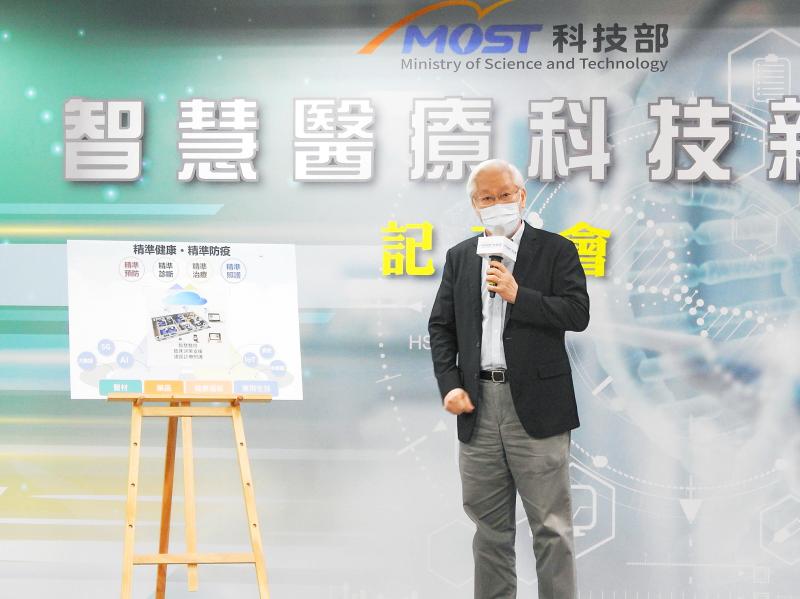Precision medicine is expected to be a flagship industry of the Taiwanese economy in the next decade, as the COVID-19 pandemic has accelerated the digital transformation of local industries, Minister of Science and Technology Wu Tsung-tsong (吳政忠) said yesterday.
Local biomedicine start-ups have over the past few years proved to be innovative, Wu told a news conference in Taipei, adding that the ministry continues to support academics in their efforts to commercialize their innovations.
Quality healthcare and advanced information and communications technologies are among Taiwan’s strengths, creating a conductive environment for the development of smart medicine, and the integration of hospital treatment and home-based healthcare, he said.

Photo courtesy of the Ministry of Science and Technology
At the event, a team of National Taiwan University Hospital’s Yunlin branch and Quanta Computer Inc personnel introduced a distance diagnostic system that would allow doctors to monitor patients’ basic health indicators without meeting them in person.
After local COVID-19 infections surged in the second half of May, the team offered 30 packages of the system to health authorities to use in quarantine facilities, Yunlin branch vice superintendent Matthew Ma (馬惠明) said.
The system is based on artificial intelligence and Internet of Things technology, Quanta Computer business headquarters associate vice president Song Chen-hwa (宋振華) said, adding that the team is looking to promote the system to Taipei Veterans General Hospital and other hospitals.
Other innovations presented at the event included an indoor positioning and tracking system developed by Academia Sinica distinguished visiting chair Jane Liu (張韻詩) and National Yunlin University of Science and Technology associate professor Edward Chu (朱宗賢).
The system, which can track the locations of patients and medical devices, helps patients call for assistance, said Chu, who consults for BiDaE Technology Inc, a start-up founded last year.
A team led by Taipei Medical University professor Chen Ray-jade (陳瑞杰) presented its Contactless Intelligent SafePass Kiosk, which helps people register personal information and contact history by using their National Health Insurance cards.
Chen, who founded the start-up Radica Health in 2019, said that the kiosk is in use in more than 30 hospitals nationwide.
A team led by National Central University professor Lo Men-tzung (羅孟宗) presented a health data monitoring system that helps medical personnel track the health status of patients with chronic conditions remotely.
Many teams started developing their products before the pandemic, Department of Academia-Industry Collaboration and Science Park Affairs Director-General Andrea Hsu (許增如) said.
COVID-19 is a crisis, but it also provides business opportunities for start-ups, she said.

DEFENSE: The National Security Bureau promised to expand communication and intelligence cooperation with global partners and enhance its strategic analytical skills China has not only increased military exercises and “gray zone” tactics against Taiwan this year, but also continues to recruit military personnel for espionage, the National Security Bureau (NSB) said yesterday in a report to the Legislative Yuan. The bureau submitted the report ahead of NSB Director-General Tsai Ming-yen’s (蔡明彥) appearance before the Foreign and National Defense Committee today. Last year, the Chinese People’s Liberation Army (PLA) conducted “Joint Sword-2024A and B” military exercises targeting Taiwan and carried out 40 combat readiness patrols, the bureau said. In addition, Chinese military aircraft entered Taiwan’s airspace 3,070 times last year, up about

The Overseas Community Affairs Council (OCAC) yesterday announced a fundraising campaign to support survivors of the magnitude 7.7 earthquake that struck Myanmar on March 28, with two prayer events scheduled in Taipei and Taichung later this week. “While initial rescue operations have concluded [in Myanmar], many survivors are now facing increasingly difficult living conditions,” OCAC Minister Hsu Chia-ching (徐佳青) told a news conference in Taipei. The fundraising campaign, which runs through May 31, is focused on supporting the reconstruction of damaged overseas compatriot schools, assisting students from Myanmar in Taiwan, and providing essential items, such as drinking water, food and medical supplies,

A magnitude 4.3 earthquake struck eastern Taiwan's Hualien County at 8:31am today, according to the Central Weather Administration (CWA). The epicenter of the temblor was located in Hualien County, about 70.3 kilometers south southwest of Hualien County Hall, at a depth of 23.2km, according to the administration. There were no immediate reports of damage resulting from the quake. The earthquake's intensity, which gauges the actual effect of a temblor, was highest in Taitung County, where it measured 3 on Taiwan's 7-tier intensity scale. The quake also measured an intensity of 2 in Hualien and Nantou counties, the CWA said.

STRICTER ENFORCEMENT: Taipei authorities warned against drunk cycling after a sharp rise in riding under the influence, urging greater public awareness of its illegality Taipei authorities have issued a public warning urging people not to ride bicycles after consuming alcohol, following a sharp rise in riding under the influence (DUI) cases involving bicycles. Five hundred and seven people were charged with DUI last year while riding YouBikes, personal bicycles, or other self-propelled two-wheelers — a fourfold increase from the previous year, data released by the Taipei Police Department’s Traffic Division showed. Of these, 33 cases were considered severe enough to be prosecuted under “offenses against public safety,” the data showed. Under the Road Traffic Management and Penalty Act (道路交通管理處罰條例), bicycles — including YouBikes and other